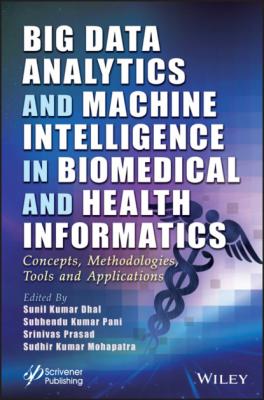Big Data Analytics and Machine Intelligence in Biomedical and Health Informatics. Группа авторов
Чтение книги онлайн.
Читать онлайн книгу Big Data Analytics and Machine Intelligence in Biomedical and Health Informatics - Группа авторов страница 3
 3.31 ROC curve and predictions.Figure 3.32 Machine Learning Algorithms Comparison.Figure 3.33 Predicting the Alzheimer’s progression: (a) Nondemented (99.13%), (b...Figure 3.34 Validation status.Figure 3.35 Confusion matrix.Figure 3.36 Metric measures of MobileNetV2 during training and validation.
3.31 ROC curve and predictions.Figure 3.32 Machine Learning Algorithms Comparison.Figure 3.33 Predicting the Alzheimer’s progression: (a) Nondemented (99.13%), (b...Figure 3.34 Validation status.Figure 3.35 Confusion matrix.Figure 3.36 Metric measures of MobileNetV2 during training and validation.4 Chapter 4Figure 4.1 Image segmentation techniques.Figure 4.2 Process for identifying and detecting retinal diseases.Figure 4.3 Extraction of gray-scaled green channel of image taken from DRIVE dat...Figure 4.4 Input image passing through different pre-processing stages. (a) Inpu...Figure 4.5 Output image of pre-processing stage passing through different phaseb...Figure 4.6 Output of images of segmentation stage with various options [18].Figure 4.7 Segmented image of proposed method [18] vs gold standard image for CH...Figure 4.8 ROI extraction of proposed method [34] on a given input image taken f...Figure 4.9 Results of OD segmentation of proposed method [34].Figure 4.10 Results of OC segmentation of proposed method [34].
5 Chapter 5Figure 5.1 Neural Network and Fuzzy Systems (NNFS) development contains five ste...Figure 5.2 Methodology of ML for healthcare data analytics.Figure 5.3 Use ML algorithms for several evaluation analyses based on storage da...Figure 5.4 Conceptual architecture of big data analytics for health informatics.Figure 5.5 Hadoop system architecture.Figure 5.6 MapReduce procedure.
6 Chapter 6Figure 6.1 Framework of AI.Figure 6.2 Basic framework of an expert system.
7 Chapter 7Figure 7.1 Representing of infection spreading in COVID-19.Figure 7.2 (a) Initially all nodes are healthy with black color.Figure 7.2 (b) After attacking, virus nodes are represented in red color. (c) In...Figure 7.2 (d) Virus transmission without social distance leads to more red colo...Figure 7.2 (f) Deploying antivirus in some nodes which are healthy and represent...Figure 7.2 (h) Antivirus will spread over a period of time then slowly red will ...Figure 7.2 (j) Sample out of proposed model for population 200.Figure 7.3 (a) Covid spreading without social distancing, clearly shows that eff...Figure 7.3 (b) Covid spreading with social distancing, clearly shows that effect...
8 Chapter 8Figure 8.1 Structure of blockchain.Figure 8.2 Layered approach for stakeholders.Figure 8.3 Data divided among various stakeholders.Figure 8.4 Ethereum Blockchain for patient–doctor interaction.Figure 8.5 Ethereum Blockchain use case for patient, doctor and pharmacy interac...Figure 8.6 Flow of process for reports.Figure 8.7 Drug inventory and supply chain management.Figure 8.8 Workflow of the health insurance companies.Figure 8.9 Flowchart for automated flow of diagnosis.
9 Chapter 9Figure 9.1 Proposed architecture for level visualization.Figure 9.2 Contact rate estimator.Figure 9.3 Epidemiological layer.Figure 9.4 Relative errors of the prediction of the number of infected, recovere...Figure 9.5 Relative error of the number of infected patients compared with SIDAR...Figure 9.6 Illustrates a sharp drop in contact rate over lockdown.Figure 9.7 Analysis of the predicted total number of infected individuals by dec...
10 Chapter 10Figure 10.1 e-Health working process with doctor communicates the prescription t...Figure 10.2 Big Data-Data Processing. Image Source: https://www.congruentsoft.co...
11 Chapter 11Figure 11.1 Potential continual learning algorithms.Figure 11.2 The four stages of drug development, along with Phase IV.Figure 11.3 Drug development cost.Figure 11.4 Stages of ML in radiology.Figure 11.5 Medical imaging AI specialists by clinical application.Figure 11.6 Medical imaging AI specialists by clinical application department wi...Figure 11.7 Digital pathology market maturity and growth forecast.Figure 11.8 Centralized clinical data hubs.
12 Chapter 12Figure 12.1 Conceptual framework from literature review.
List of Tables
1 Chapter 2Table 2.1 Variables description.Table 2.2 Bivariate logistic regression with AOR to distribution of child alive ...Table 2.3 Ranked Boruta features importance result.Table 2.4 Data imbalance sampling technique result.Table 2.5 Comparing sampling method.Table 2.6 Performance of Naïve Bayes classifier.Table 2.7 Performance of C5.0 classifier.Table 2.8 Confusion Matrix of SVM Imbalanced data.Table 2.9 Performance of SVM on prediction on imbalanced data.Table 2.10 Confusion Matrix for SVM balanced data.Table 2.11 Performance of SVM on prediction on balanced data.Table 2.12 Performance of Random Forest classifier.Table 2.13 10-fold cross-validation on imbalance target data.Table 2.14 10-fold cross-validation on balance target data.
2 Chapter 3Table 3.1 Individual’s demographics and their dementia status.Table 3.2 Basic characteristics’ of MRI with Clinical Dementia Rating (CDR).Table 3.3 Descriptive quantitative variables (n = 373).Table 3.4 Actual vs Predicted.Table 3.5 Accuracies of different algorithms.Table 3.6 Training status.Table 3.7 Comparison of transfer learning pretrained CNN learners.
3 Chapter 4Table 4.1 Comparison of proposed method [18] with other segmentation methods usi...Table 4.2 The results of OC segmentation of proposed method [34] using a differe...
4 Chapter 5Table 5.1 Several soft technologies to fulfil various objectives.Table 5.2 Several examples of AI and ML approaches in healthcare.Table 5.3 Information of cancer disease with approaches and dataset.Table 5.4 Various big data analytics tools with functionalities.
5 Chapter 7Table 7.1 Notations used in the proposed algorithms.
6 Chapter 9Table 9.1 Dataset description.Table 9.2 Regional and provincial data are also presented in Table 9.2.
7 Chapter 11Table 11.1 Adoption index for ‘ologies’.
Guide
1 Cover
5 Preface
7 Index
Pages
1